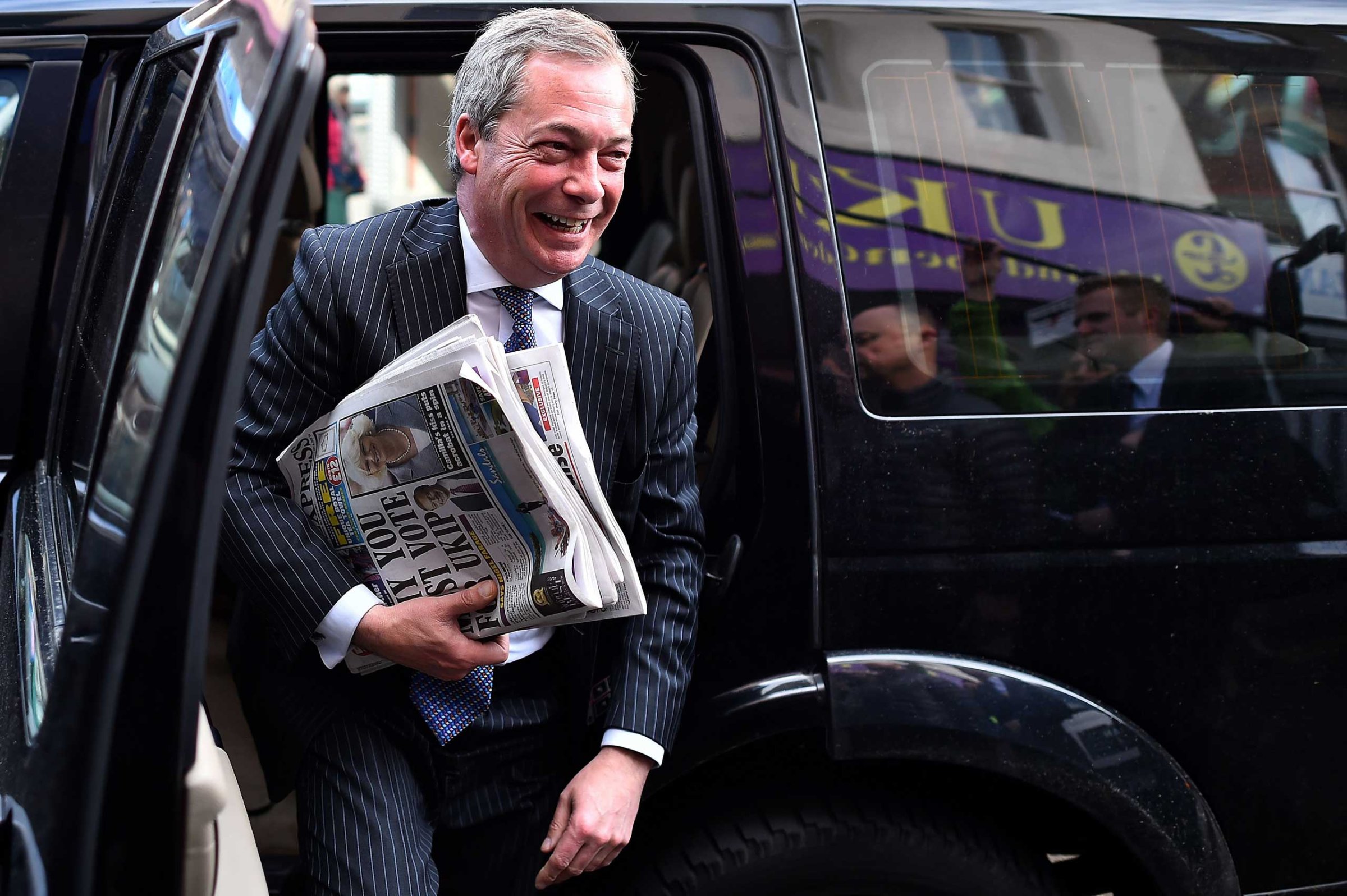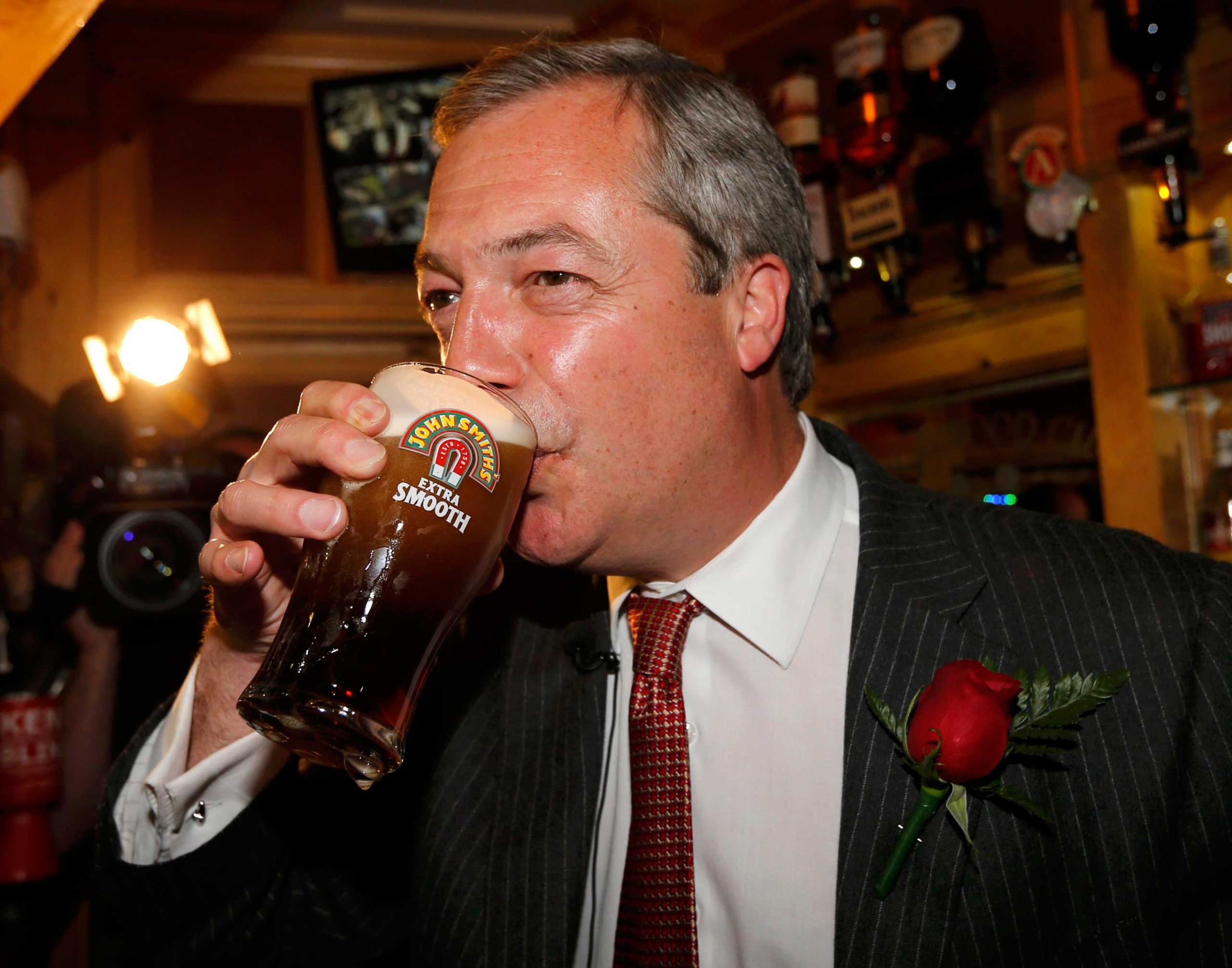
On a windy afternoon in the English seaside town of Ramsgate a red-haired young woman leans against the wall by St. Mark’s Church while heavyset men guard its entrances. “We’re just hoping to catch a glimpse of Nigel when he gets here,” she says, referring to Nigel Farage, the charismatic leader of the United Kingdom Independence Party (UKIP).
Farage, the most controversial figure in the U.K. elections, hopes to take the U.K. out of the European Union and cut immigration. Earlier this year Farage was favorite to win the seat of Thanet South, a coastal area south east of London that includes Ramsgate, but he now faces a tough fight on polling day on Thursday.
UKIP is a relatively new arrival to U.K. politics. In the 2010 general election, it polled just 3.1% of the vote but it won nearly 28% of the vote in last year’s European elections, the first time in over a century that a party other than left-of-center Labour or the right-of-center Conservatives won a national election. Prime Minister David Cameron once dismissed UKIP as a party of “loonies, fruitcakes and closet racists,” but their recent success has particularly rattled his Conservative Party.
Even loonies, fruitcakes and closet racists have a vote and they, and other voters, agree with UKIP’s main policies of opposition to the European Union and immigration. They also share an intangible desire to turn the clock back to a golden age when English was the only language that could be heard in the street and the U.K. remained outside the E.U. This attitude is personified by Farage, normally pictured holding a beer glass in a bar, and who is personally aggrieved that he needs to step outside the bar to smoke a cigarette.
On Saturday, when a reporter tells Farage of the birth of Princess Charlotte, the daughter of Prince William and Princess Kate, and that she weighs 8lbs 3oz, he is most touched by the fact the weight is given in pounds and ounces rather than kilograms. “Imperial measurements! Proper measurements – not some horrid kilograms,” he says, referring to his party’s belief that the metric system is one of the many toxic importations from the E.U. that are destroying life in the U.K.
READ MORE: This New Yorker is Already Mayor of London But Is He the Future Leader of the U.K.
UKIP has attracted party members similar to Farage, often mavericks who believe in plain talking and whose dislike of immigration can stray into racism. On Wednesday, a candidate was suspended for telling a reporter he would shoot his opponent if he won. Earlier a UKIP candidate had to resign after tweeting that black comedian Lenny Henry should emigrate to a “black country” and another was suspended Friday after a series of racist and anti-Semitic comments.

Farage is a man of contradictions. He has spoken out against the prevalence of foreign languages in the U.K. yet he is married to a German woman. He also had a well-publicised fling in 2006 with an immigrant from the Baltic state of Latvia. While he rails against Europe, he and his wife both draw healthy salaries from the European Parliament of which he is a member.
READ MORE: This Woman Is Forecast to be the Biggest Winner of the U.K. Election
The UKIP leader presents himself as an alternative to the U.K.’s political elite who seem to have more in common with each other than the general public. The fact that he was privately-educated and was a successful commodities trader has not undermined his appeal. “He’s a very down-to-earth guy,” says 18-year-old Charlie Leys, UKIP’s youngest candidate for the municipal council in Kent, the county that includes Thanet South. “People need to trust politicians again and he’s what we need.”
So far, Farage’s political clout has come less from the two parliamentary seats his party has won than from reshaping public debate around his party’s anti-Europe platform. Cameron’s pledge to give Britons a referendum on E.U. membership by the end of 2017 was seen as an attempt to stop anti-Europe members of his own party from defecting to UKIP. Labour has also responded to UKIP’s threat to its own support by promising to curb welfare benefits for immigrants, but for many, it’s too late.
“Nigel talks a lot of sense,” says Lorraine, the woman waiting outside the church in Ramsgate who declined to give her full name. A former Labour voter, she stands out in a crowd of UKIP supporters made up largely of white men in their fifties and sixties but she says that Farage is the only politician who has “got it right” concerning the “trouble” that Eastern European migrants have brought to parts of Thanet.
It’s not always clear what trouble the immigrants have brought and for many UKIP is simply xenophobic and racist. Just yards away from the party’s head office in the Ramsgate’s busy town center, a crowd of Stop UKIP activists are handing out leaflets. “Say no to racism!” they shout. “Don’t trust Nigel Farage, he’s not your mate down the pub!”
Though Farage has already exerted considerable influence over public debate, his support in the area could be weakening. An April 29 opinion poll of voters in Thanet South found the Conservatives two points ahead of UKIP, 34% to 32%.
But for many, voting for UKIP is simply a vote for change. A man in his twenties sitting outside a pub in Ramsgate says he’s voting for Farage on Thursday for one main reason: “We’ve given everyone else a chance.”
More Must-Reads From TIME
- The 100 Most Influential People of 2024
- The Revolution of Yulia Navalnaya
- 6 Compliments That Land Every Time
- What's the Deal With the Bitcoin Halving?
- If You're Dating Right Now , You're Brave: Column
- The AI That Could Heal a Divided Internet
- Fallout Is a Brilliant Model for the Future of Video Game Adaptations
- Want Weekly Recs on What to Watch, Read, and More? Sign Up for Worth Your Time
Write to Naina Bajekal / Ramsgate at naina.bajekal@time.com